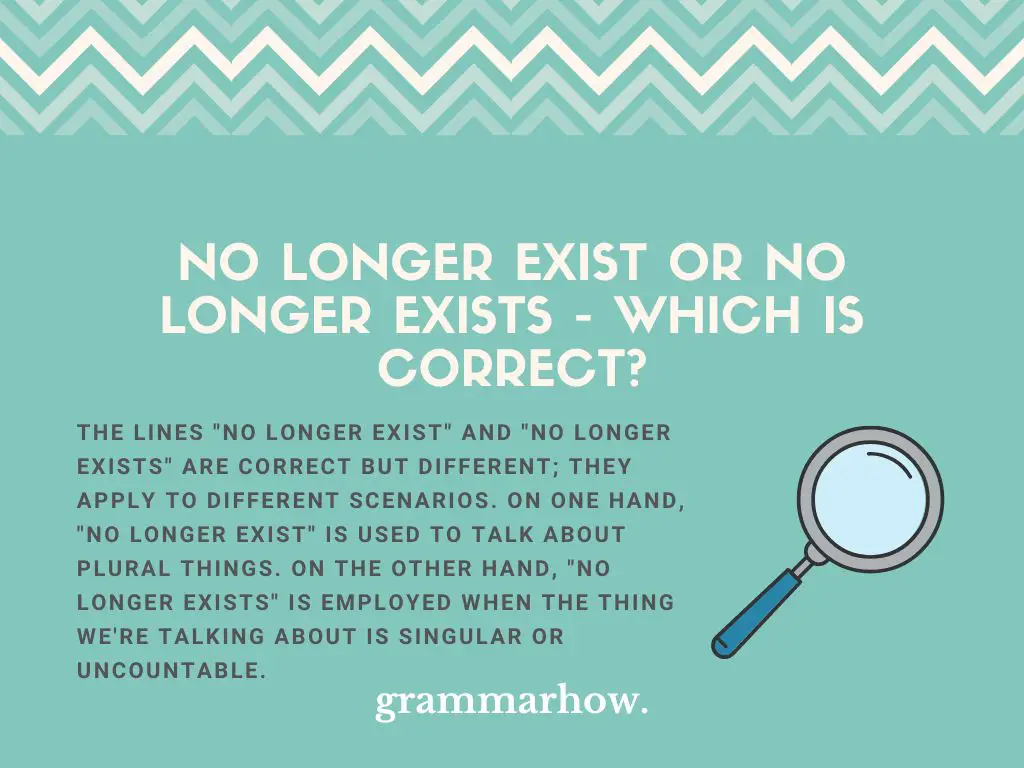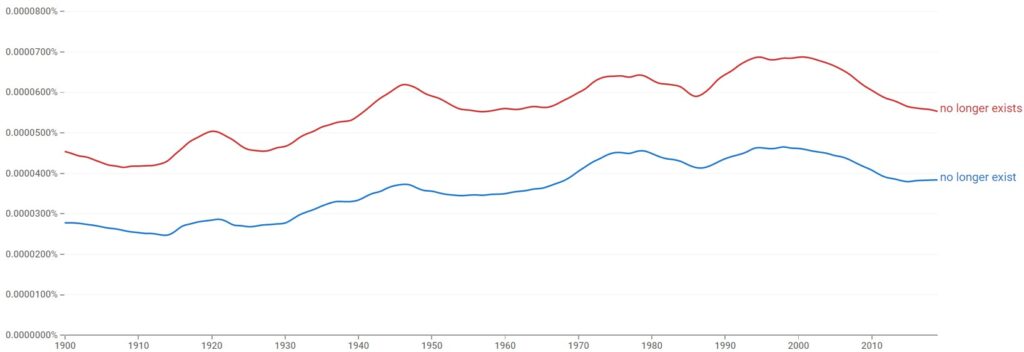We’ve all heard the lines “no longer exist” and “no longer exists” before. Yet, when using them ourselves, we get the doubt if we should or shouldn’t add the “s” at the end. If you’ve been in that situation before, you came to the right place; all answers are ahead.
No Longer Exist or No Longer Exists – Which Is Correct?
The lines “no longer exist” and “no longer exists” are correct but different; they apply to different scenarios. On one hand, “no longer exist” is used to talk about plural things. On the other hand, “no longer exists” is employed when the thing we’re talking about is singular or uncountable.

The lines “no longer exists” and “no longer exist” are synonyms but not interchangeable. This is because they are variations of the expression used in different scenarios.
In this vein, if we are to talk about an uncountable or singular noun, we have to use “no longer exists”. On the other hand, if the noun is countable and plural, like for example “steam trains”, we need to use the version without the “s”.
Finally, a third version that adds drama to the sentence could be: “exists no longer”. Yet, this is an old and dramatic use of English that would sound awkward in a casual word exchange.
No Longer Exist
The line “no longer exist” is perfectly correct and can be used to say that something countable and plural has ceased to exist. In the case the thing that ceased to exist is either uncountable or singular; the line needs to have an added “s”.
Let’s see how to use “no longer exist” in a sentence through some examples:
- There used to be seven bus terminals in the city but they no longer exist.
- The racecars from the Ferrari team used to be the best but they no longer exist.
- Some things leave a huge void when they no longer exist.
- If the palaces no longer exist; where do the king and the courtesans live their lives?
- I was about to buy some comic books for my nephews but the ones I like no longer exist.
- My life hasn’t been the same since they stopped making that chocolate; I can’t get over the fact Snicker’s no longer exist.
- The revolutions that shook the world in the past century were the expression of ideas that no longer exist.
No Longer Exists
The line “no longer exists” is a perfect use of the English Language and is used to talk about something or someone that has ceased to exist. This is the singular version of the line that can only be applied to singular and uncountable nouns.
Let’s see how to use “no longer exists” in a sentence through some examples:
- The world we knew about when we were children no longer exists.
- Martha always says that good public education no longer exists, but I think she’s wrong.
- I can’t even think about it; the opportunity to make it to the big screen no longer exists.
- Are you telling me Samuel forbid you from coming? I’m the owner and the ban no longer exists.
- When I was little I used to go up the hill to play in a barn that no longer exists.
- The manual transmission I learned how to race with no longer exists. I’m devastated.
- My favorite guitar brand used to make a model I loved but no longer exists.
Which Is Used the Most?
When checking on a word’s popularity level there’s no tool more powerful than the Google Ngram Viewer. Let’s see what it says about “no longer exist” and “no longer exists”.

The popularity levels of “no longer exist” and “no longer exists” follow an almost identical curve. That being said, “no longer exists” has historically been more popular for the past century being used almost 150% more than “no longer exist”.
Nowadays, both expressions enjoy a similar popularity level and while “no longer exist” is on the rise “no longer exists” is on a negative trend.
Final Thoughts
“No longer exist” is used to talk about plural, countable things that have ceased to exist. On the other hand, “no longer exists” is used to talk about singular or uncountable things that have ceased to exist. They are synonyms but not exchangeable since they apply to different scenarios.

Martin holds a Master’s degree in Finance and International Business. He has six years of experience in professional communication with clients, executives, and colleagues. Furthermore, he has teaching experience from Aarhus University. Martin has been featured as an expert in communication and teaching on Forbes and Shopify. Read more about Martin here.
